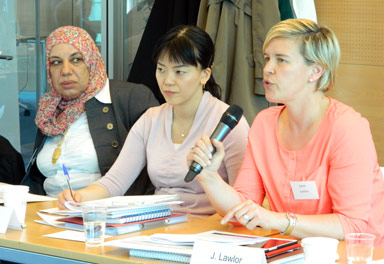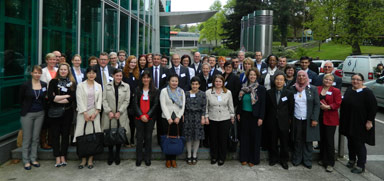Handling gender-related complaints in the armed forces
An important barrier to women’s retention and equal participation in the armed forces is gender-based discrimination, harassment and abuse. Investigating related complaints and providing victim support during operations abroad can be particularly challenging. A recent NATO-sponsored workshop looked at possible practical solutions to these issues.

“For many women in the armed forces, filing a gender-related complaint can end their career,” said Michael Gaul, Senior Advisor in NATO’s Emerging Security Challenges Division. “The need for strong and effective policies to protect against gender-based discrimination, harassment and abuse is therefore more important than ever.”
While many armed forces are improving how they handle these complaints, much work remains to be done and efforts continue towards achieving equality continue.

NATO’s Science for Peace and Security (SPS) Programme recently sponsored a workshop aimed at sharing good practices for handling gender-related complaints in the armed forces. Participants from 30 NATO member and partner countries took part in the event, which was organised from 28 to 30 April 2015 by the Geneva Centre for the Democratic Control of Armed Forces (DCAF) and the Parliamentary Ombudsman for the Norwegian Armed Forces.
“Building and fostering a positive environment for women in the armed forces is extremely important. This workshop brought together some of the leaders in NATO countries and its partners working to accomplish just this,” said Hans Born, Deputy Head of DCAF’s Research Division. “Participants shared their countless years of experience, and learned from their peers, while also building closer networks and cooperation between NATO members and partners.”
“I am grateful to have had the opportunity to share my experiences. Being able to learn from so many interesting and experienced individuals has been extremely useful to me, and I am looking forward to using many lessons and good practices learned at the workshop back in my daily work,” said Diana Molodilo, Head of the Policy Analysis, Monitoring and Evaluation Division at the Moldovan Ministry of Defence.
Promoting women’s participation in armed forces
Currently some 400,000 women serve in the armed forces in NATO countries, representing an average of 10 per cent of personnel.
Not only are the numbers of servicewomen steadily increasing but higher ranked positions and new opportunities in combat roles are opening up to women in armed forces across NATO member and partner countries.

“Leadership is a question of personality and not of gender,” said Brigadier General Nawal M. Al-Nsoor, Director of Women’s Affairs within the Jordanian Armed Forces, which today includes 10,000 servicewomen.
Nevertheless, the armed forces remain a male-dominated environment. Both men and women in leadership positions within armed forces are responsible for ensuring that no-one is discriminated against, harassed, or abused due to their gender or for any other reason.
One of the outputs of the workshop will be a handbook focusing specifically on preventing, responding to and monitoring complaints, which will serve as a resource for national armed forces and defence ministries.
